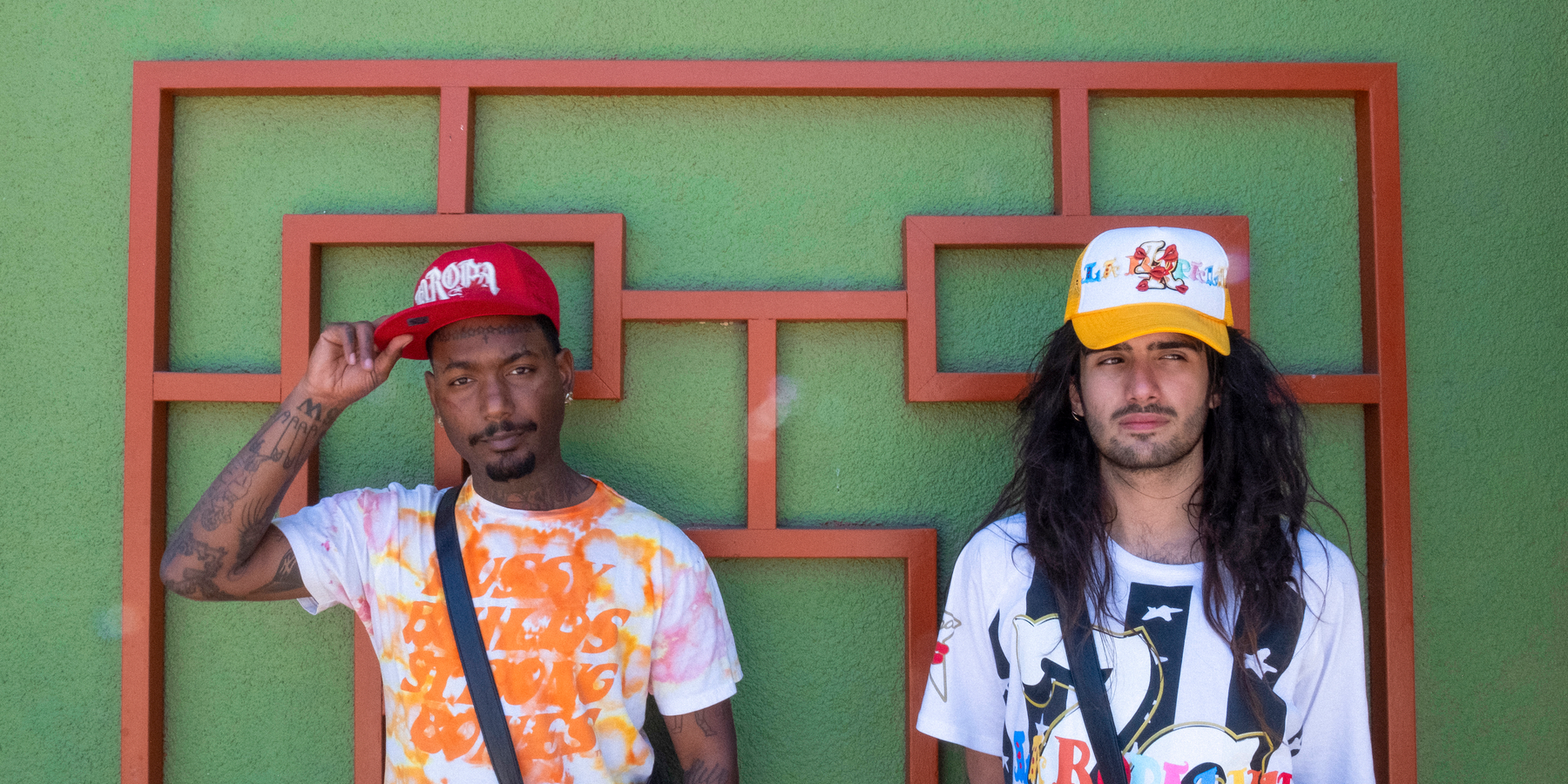
Beneath the armpit of the 110 is the Royal Pagoda Motel, a chintzy motor lodge with the kind of upturned eaves and dragon doorknockers you'd expect from LA's Chinatown. From the outside, it looks abandoned, the neon lights burnt out and the parking lot cordoned off, the lobby dark and dusty as I peer through the window. Visibly confused, my companions — Jimbo Williams and Aristotle Sanchez — begin to wonder what's going on, before a security guard walks over to inform us we can't come in. "The building's been converted into housing for the homeless," he says with a grumpy frown as Williams and Sanchez ask if their friend still works there. And while they continue to protest in the background, all I can think about is how strange this synchronicity is — how odd that things have circled back to this point and how ironic that this also used to be their home.
Back when Williams and Sanchez first moved to LA, the Royal Pagoda was where they slept at night and worked by day — a space they'd use to screenprint shirts for their burgeoning fashion brand, La Ropa. At that point, it was a two-man operation, started with zero capital with an Instagram account and BigCartel shop, though you'd never be able to tell now. In fact, you'd probably think La Ropa had always been this big — a viral cult favorite with an ardent celebrity fanbase who adores its hip hop maximalism, eye-popping colors and provocative slogans.
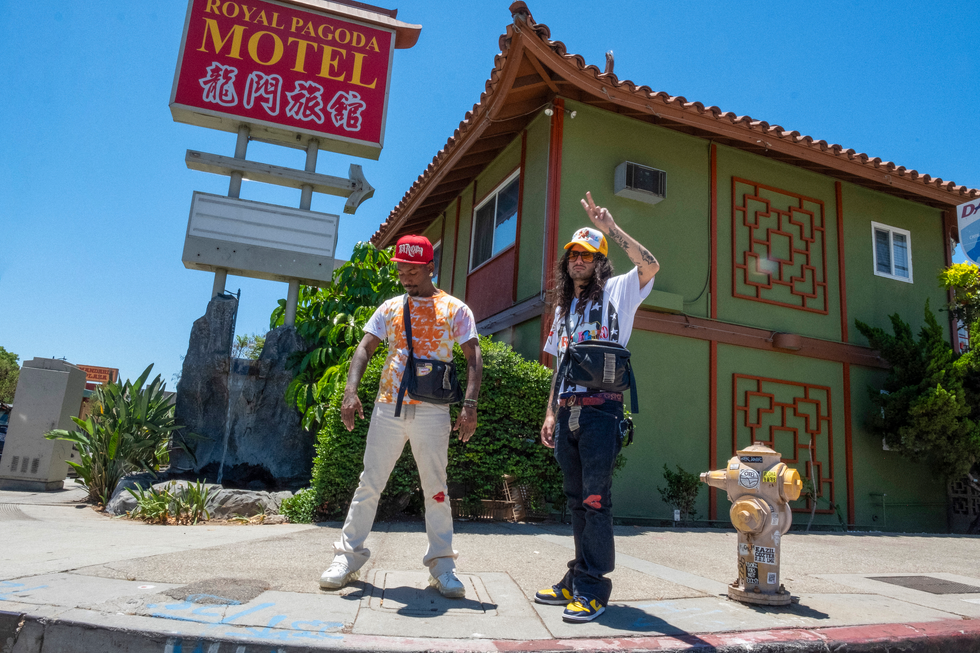
Photo by Lily Lauria
Six years later, the self-described "comotional" brand now counts everyone from A$AP Rocky to Bella Hadid and Erika Jayne as customers. But even as a line imbued with a DIY punk rock spirit, it's one that also takes pride in its refusal to skimp on overhead costs, as proven by their use of premium materials and an attention-grabbing storefront on a coveted stretch of Melrose Avenue. From the sidewalk spray painted with their distinctive red lip logo to the crowd of LA tastemakers who hang around the store, the aptly named La Ropa Land stands out amongst all the blow-out bars and boutiques lining the rest of the street.
For many, La Ropa's appeal lies in its core philosophy, AKA be influenced by a little bit of everything. So whether a piece references tagging or Marina Abramović or "the old Asian lady in Chinatown," there's something oddly universal about everything in the store. And maybe it's because the only thing you need to be a La Ropa person is a devil-may-care attitude and a willingness to be "uncomfortable," as Williams explained. Especially since nothing quashes innovation quite like settling for the status quo.
Granted, that's not a hollow sentiment given the history of La Ropa and its co-founders' respective backgrounds. Back in their hometown of Toronto, Williams grew up with creative aspirations and an interest in clothes. After a devastating attack left him "pretty much paralyzed" for several months, the 28-year-old decided to follow his heart by dropping out of business school and learning to sew in an effort to put his "energy into whatever the fuck I wanted to do." Which meant that once he met the 22-year-old Sanchez — a lifelong artist who also shared his deep love of fashion and style — their close friendship gradually blossomed into a popular clothing brand called Insubordinate.
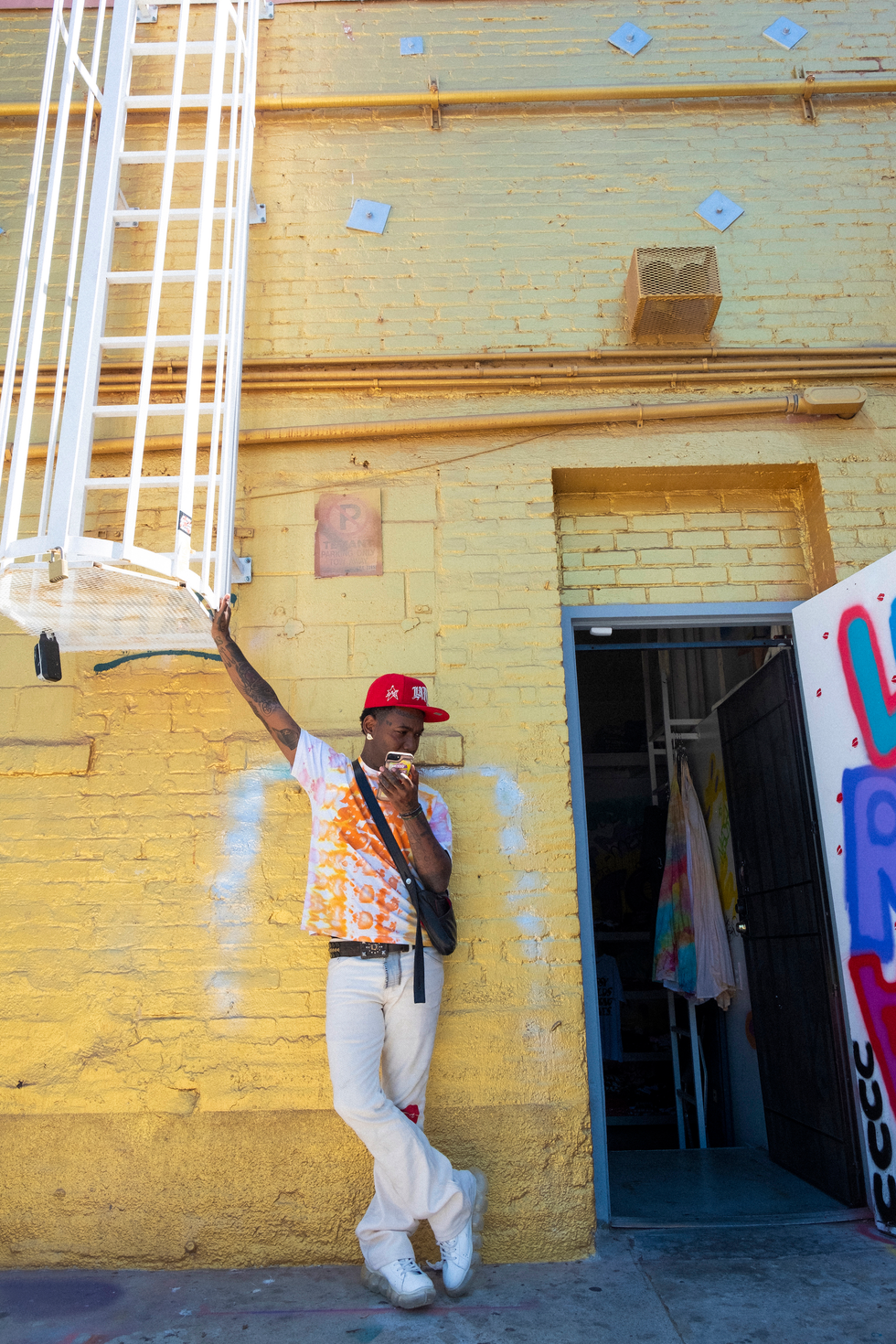
Photo by Lily Lauria
The two eventually found themselves frustrated with Toronto's cultural "glass ceiling" after a few years of success, which eventually prompted them to move to New York with a combined $800 in their pockets. Even so, they were soon "partying with some of the biggest people," making friends with influencers and celebrity stylists, all while homeless and sitting in McDonald's to charge their phones. During this time they still managed to build up an Instagram following for their thrifted creations while stockpiling their own designs for a new brand they dubbed "La Ropa," after the Spanish word for "clothes." And according to a chuckling Williams, the name was a dual reference to both America's "second language" and the alleged "copycats" at Vetements (whose name also means "clothes," but in French).
Independent of any drama though, the brand quickly took on a life of its own thanks to a whisper network of underground streetwear enthusiasts, all of whom would flock to Grailed for the thrifted items Williams and Sanchez began to customize together. So even if they were just two "homeless dudes carrying huge bags and walking into people's offices," as Sanchez recalled, they still managed to build a strong online following that would instantly buy out whatever they were selling.
But after demand grew when Playboi Carti started wearing their signature "Pussy Builds Strong Bones" shirt, Williams and Sanchez also found themselves homeless once again. And all of this made them decide to pack up shop and drive cross-country to LA, where they found a growing market, more production opportunities and a new business strategy. Namely, one that revolved around branding and more celebrity co-signs, or "selling a lot of good images," as Williams put it.
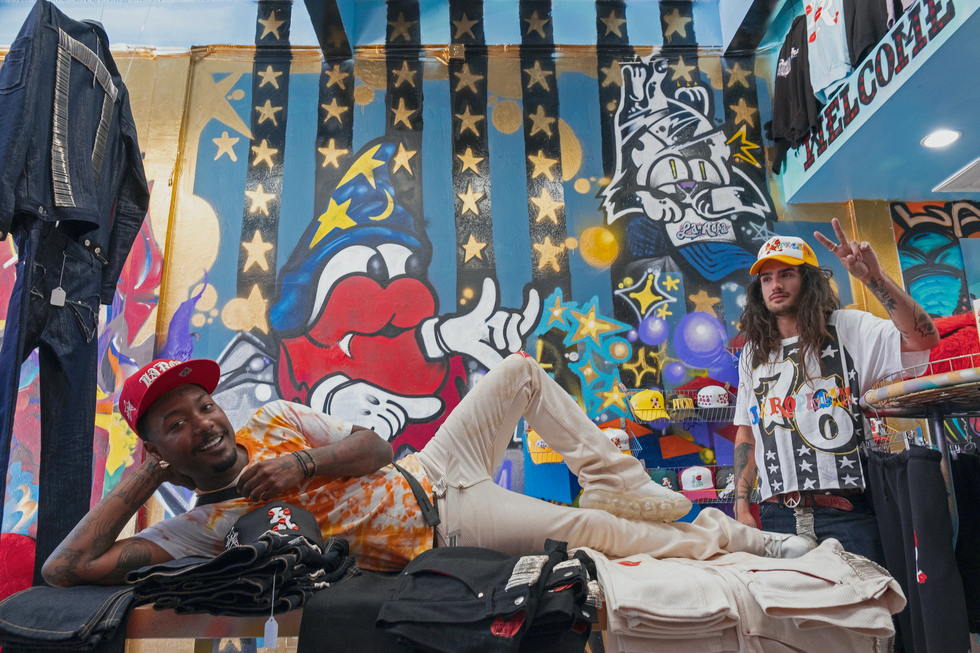
Photo by Lily Lauria
The switch has been working pretty well if their two stores — the one on Melrose and a second in downtown — are any indication. However, even if the celebrities are coming for the clothes right now, Sanchez also went on to emphasize that La Ropa is "more than just clothing," with Williams chiming in that the brand is an entire lifestyle based on a particular "vibe." Whether we're talking about Japanese denim jeans decorated with safety pins or a trucker hat-slash-bandana emblazoned with those pop art-inspired lips, Williams said their brand isn't designed for a specific demographic.
Instead, he said that all you really need to wear La Ropa is a strong "opinion," a deep desire to "push limits and do things that are uncomfortable" and an open mindset that defies labels and limiting preconceptions. At the end of the day, anyone can be a La Ropa person and that philosophy also comes with the goal of becoming an all-encompassing brand — clothes, art, furniture and more. In fact, they eventually want La Ropa to mirror what fashion and lifestyle giant Ralph Lauren does as a brand that's sold "everywhere," in small businesses and department stores alike.
"No matter where you are, you know what Ralph Lauren is. That's our goal," he said, citing the designer's ability to create a brand that "everyone owns" a piece of, regardless of race, class and gender. "The same [applies] to La Ropa. No matter where you are, you know what it is. We have our ethos for it, but it's for everybody. If you like it, buy it."
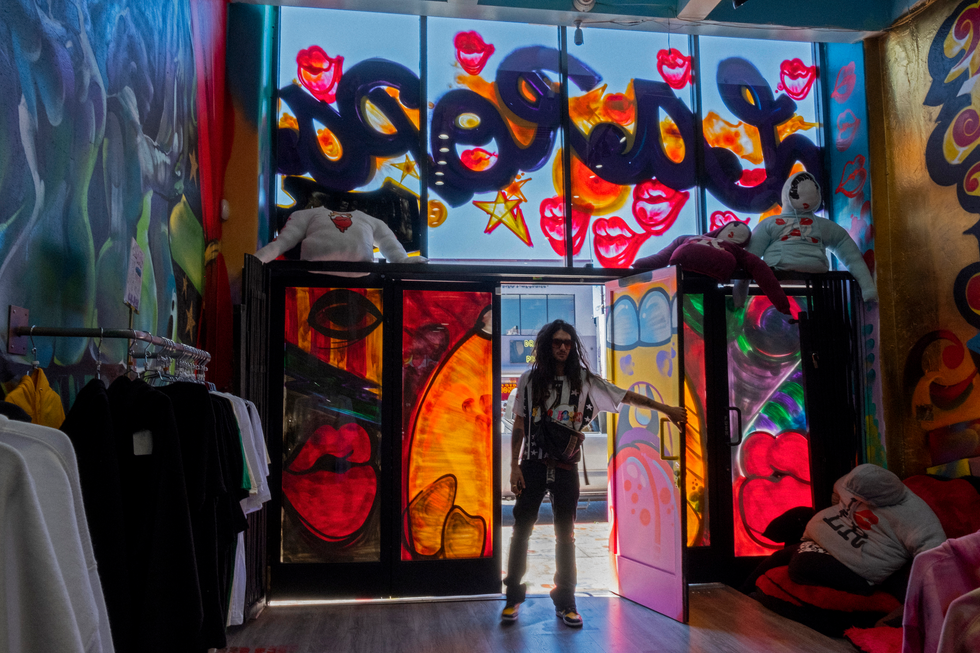
Photo by Lily Lauria
La Ropa isn't just going to stop at clothes and home goods either, because according to Williams, they also have ambitious plans to expand to every continent and even host music festivals one day. All the while though, La Ropa as a business will continually be evolving to the point where it's about more than just clothes. After all, as Sanchez went on to add, the one thing that will always be consistent is a renegade spirit that facilitates a consistently "crisp vision" that's entirely in "our own world."
"We make clothes for free-minded people," he said. "And even if you're not free-minded, we're here to your mind through the clothes."
La Ropa's pop-up at Fred Segal Malibu is open now through October 15th.
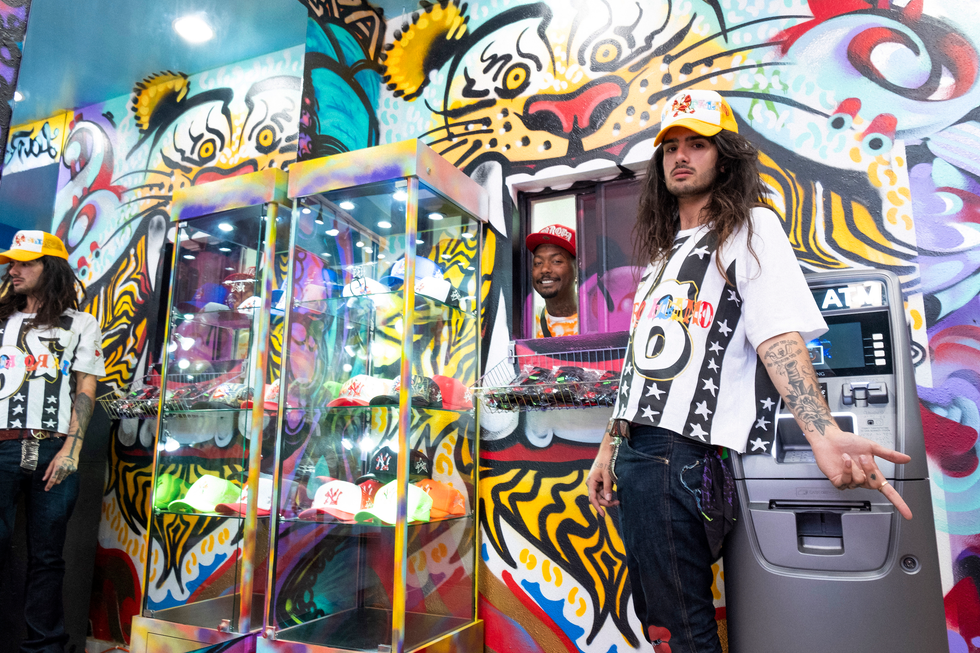
Photo by Lily Lauria
Welcome to "Internet Explorer," a column by Sandra Song about everything Internet. From meme histories to joke format explainers to collections of some of Twitter's finest roasts, "Internet Explorer" is here to keep you up-to-date with the web's current obsessions — no matter how nonsensical or nihilistic
Photos by Lily Lauria / Courtesy of La Ropa
From Your Site Articles
Related Articles Around the Web